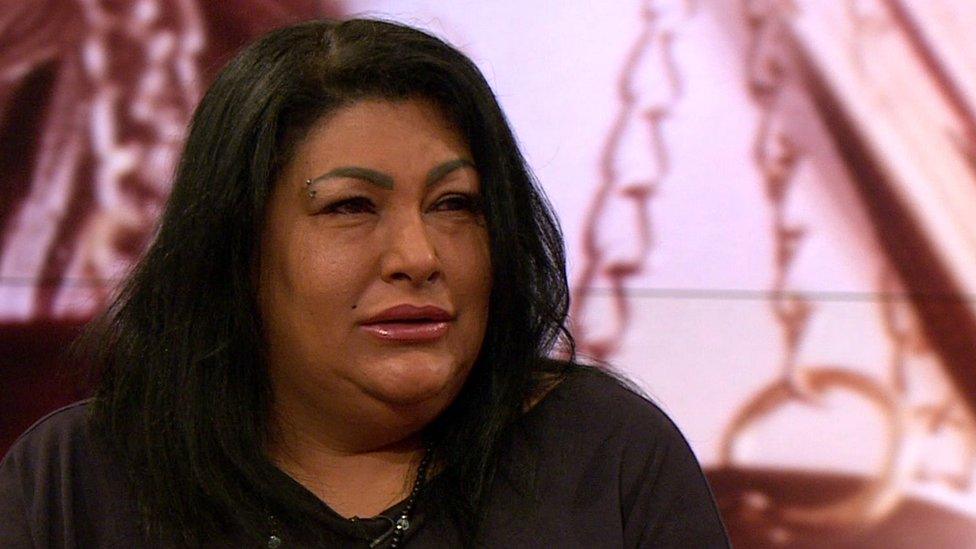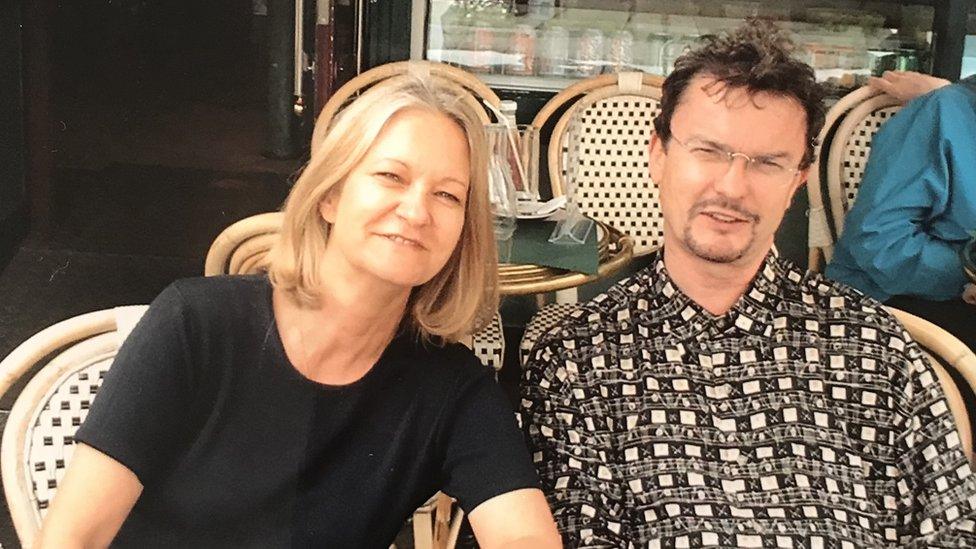Farieissia Martin 'has hope' over right to appeal murder conviction
- Published

Farieissia Martin was suffering from post-traumatic stress disorder when she stabbed her ex-partner, campaigners say
A woman who murdered an abusive ex-partner has "hope" after winning the first stage of a bid to overturn her conviction, her mother has said.
Farieissia Martin, 26, stabbed Kyle Farrell, 21, during a row at her home in Liverpool in November 2014.
The Court of Appeal heard she suffered repeated physical and emotional abuse, which was never evaluated during the original trial, Lyly Maughan said.
She said her daughter never intended to hurt Mr Farrell "in that way".
Martin was jailed for at least 13 years at Liverpool Crown Court in June 2015.
"I was devastated when it came back as murder," Ms Maughan said. "The barristers had prepared us it would be manslaughter. I was in shock, it was unreal."
'Power over her'
The Court of Appeal has given her the go-ahead to challenge the murder conviction.
The court heard Martin was the repeated victim of domestic abuse during the five-year relationship with Mr Farrell, including physical violence, insults, and isolation from family and friends.

Kyle Farrell died of a single stab wound
Ms Maughan told the BBC's Victoria Derbyshire programme during the relationship Martin had gone from being "bubbly and bright and shining" to "dull and miserable".
She added her daughter had tried to hide her bruises, but that she had seen her face "black and blue".
The mother of two would say the injuries had been sustained from an oven door that jammed, or make similar excuses, Ms Maughan explained.
"It was like he had some power over her.
"She'd come to my house and be adamant she was staying with me no matter what. Then the phone would ring and ring and she'd end up going home, in a panic."
After Martin was convicted in 2015, police said the couple were in a sometimes "volatile relationship and... there had been verbal and physical abuse from both sides in the past."
Clare Wade QC, for Martin, told the Court of Appeal a forensic psychiatrist and a clinical psychologist have both concluded she was suffering from post-traumatic stress disorder (PTSD) and traumatic amnesia at the time of the killing, and her ability to exercise self control would have been "substantially impaired".

Lyly Maughan told the BBC her daughter's murder conviction was a miscarriage of justice
Ms Maughan said on the day of the stabbing, which took place at Martin's home in Charlecote Street, Dingle, "she was defending herself".
She told the BBC the murder conviction was a miscarriage of justice because Martin "didn't intend to hurt [Mr Farrell] in that way".
Martin's spirits "are lifted now, she feels more positive" - but that she knows "we've still got work to do", Ms Maughan said.
The bid for appeal follows the successful challenge brought by Sally Challen over her conviction for the murder of her husband Richard.
Ms Challen's conviction was quashed by the Court of Appeal in a landmark decision in February, after her lawyers argued she had been the victim of her husband's coercive and controlling behaviour throughout their marriage.

Sally and Richard Challen had two sons and had been married for 31 years
Ms Challen's lawyer, Harriet Wistrich, is also representing Martin - and said there were similarities between the two cases.
"Both their relationships were characterised by coercively controlling behaviour," she said. "Violence, name calling, attempt to isolate her from her family and friends.
"A lot of that didn't come out at [Martin's original] trial... the legal team didn't explore the psychiatric evidence at all."
"Her reaction would have been hyper-vigilant, she may have lost control as the consequence of the operation of that mental state," Ms Wistrich explained.
Lady Justice Simler, sitting at the Court of Appeal, said it was "arguable" evidence about the mental disorders Martin had at the time of the killing would have affected the jury's verdict.
Ms Wistrich said if Martin's legal team were able to persuade a court that the conviction was unsafe, they would either look to substitute the murder conviction for manslaughter, or return for a retrial.
"She might then be free to come out for her children."

Follow the BBC's Victoria Derbyshire programme on Facebook, external and Twitter, external - and see more of our stories here.
- Published3 December 2019
